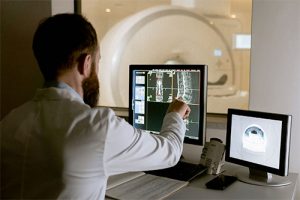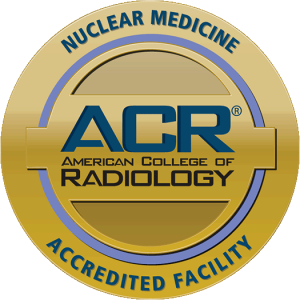Nuclear Medicine
What is Nuclear Medicine?
 Nuclear medicine is a subspecialty within the field of radiology. It comprises diagnostic examinations that result in images of body anatomy and function. The images are developed based on the detection of energy emitted from a radioactive substance given to the patient, either intravenously or by mouth. Generally, radiation to the patient is similar to that resulting from standard x-ray examinations.
Nuclear medicine is a subspecialty within the field of radiology. It comprises diagnostic examinations that result in images of body anatomy and function. The images are developed based on the detection of energy emitted from a radioactive substance given to the patient, either intravenously or by mouth. Generally, radiation to the patient is similar to that resulting from standard x-ray examinations.
Nuclear Medicine and molecular imaging are playing an increasingly important role in patient care, medical research, and pharmaceutical development.
Today, nuclear and molecular diagnostic imaging studies are available for virtually every major organ system in the body. The number of nuclear medicine– based therapies for cancer and other disorders is also expanding.
Here at Lakes Radiology, we offer most of the Nuclear Medicine procedures available. By having multiple scanners in the same suite we can offer faster service, faster scanning times and more redundancy for our patients and referring doctors.
What are some common uses of the procedure:
Nuclear medicine images can assist the physician in diagnosing diseases. Tumors, infection and other disorders can be detected by evaluating organ function. Specifically, nuclear medicine can be used to:
- Analyze kidney function
- Image blood flow and function of the heart
- Scan lungs for respiratory and blood-flow problems
- Identify blockage of the gallbladder
- Evaluate bones for fracture, infection, arthritis or tumor
- Determine the presence or spread of cancer
- Identify bleeding into the bowel
- Locate the presence of infection
- Measure thyroid function to detect an overactive or underactive thyroid
How should I prepare for the procedure?
Usually, no special preparation is needed for a nuclear medicine examination. However, if the procedure involves evaluation of the stomach, you may have to skip a meal before the test. If the procedure involves evaluation of the kidneys, you may need to drink plenty of water before the test.
If you are getting a cardiac stress test performed You should avoid caffeine (coffee, tea, etc.) and smoking for 48 hours before the examination. You should not eat or drink anything after midnight before the procedure, but continue taking medications with small amounts of water unless your physician says otherwise.
Wear comfortable, walking shoes and loose-fitting clothes for your procedure. Tell the technologist and supervising physician if you have asthma or a chronic lung disease or have problems with your knees, hips or keeping your balance, which may limit your ability to perform the exercise needed for this procedure.
How does the procedure work?
You are given a small dose of radioactive material, usually intravenously but sometimes orally, that localizes in specific body organ systems. This compound, called a radiopharmaceutical agent or tracer, eventually collects in the organ and gives off energy as gamma rays. The gamma camera detects the rays and works with a computer to produce images and measurements of organs and tissues.
If a cardiac stress test is being performed the Coronary arteries are best evaluated by determining the changes in blood flow o the heart due to exercising. Consequently, you will undergo a stress test, most commonly through physical exercise, to make your heart works harder than normal. Then you will be given a radioactive compound, called a radiopharmaceutical agent or tracer. This compound will collect in parts of your heart with good blood flow and will give off gamma rays. The gamma camera detects the rays. Subsequently, a computer following a set of complicated mathematical formulas will construct images of the heart based on the detected gamma rays.
How is the procedure performed?
A radiopharmaceutical agent is usually administered into a vein. Depending on which type of scan is being performed, the imaging will be done either immediately, a few hours later, or even several days after the injection. Imaging time varies, generally ranging from 20 to 45 minutes. The radiopharmaceutical that is used is determined by what part of the body is under study, since some compounds collect in specific organs better than others. Depending on the type of scan, it may take several seconds to several days for the substance to travel through the body and accumulate in the organ under study, thus the wide range in scanning times.
If a cardiac stress test is being performed You will be asked to exercise until you are either too tired to continue or short of breath, or if you experience chest pain, leg pain, or other discomfort that causes you to want to stop. If you are given a medication to increase blood flow because you are unable to exercise, the medication may induce a brief period of feeling anxious, dizzy, nauseous, shaky or short of breath.
In rare instances, if the side effects of the medication are severe or make you too uncomfortable, other drugs can be given to stop the effects.
While the images are being obtained, you must remain as still as possible. This is especially true when a series of images is obtained to show how an organ functions over time.
After the procedure, a physician with specialized training in nuclear medicine checks the quality of the images to ensure that an optimal diagnostic study has been performed.
What will I experience during the procedure?
Some minor discomfort during a nuclear medicine procedure may arise from the intravenous injection, usually done with a small needle. With some special studies, a catheter may be placed into the bladder, which may cause temporary discomfort. Lying still on the examining table may be uncomfortable for some patients. Most of the radioactivity passes out of your body in urine or stool. The rest simply disappears through natural loss of radioactivity over time.
Who interprets the results and how do I get them?
Most patients undergo a nuclear medicine examination because their primary care physician has recommended it. A physician who has specialized training in nuclear medicine will interpret the images and forward a report to your physician. It usually takes two days or so to interpret, report and deliver the results.
ACR Accreditation
 Lakes Radiology is an Accredited Facility with the American College of Radiology. ACR Accreditation is recognized as the gold standard in medical imaging since 1987.
Lakes Radiology is an Accredited Facility with the American College of Radiology. ACR Accreditation is recognized as the gold standard in medical imaging since 1987.
The American College of Radiology® (ACR®) is a nonprofit professional society representing radiologists, nuclear medicine physicians, radiation oncologists and medical physicists. It is the largest and oldest imaging accrediting body in the U.S., with a current membership of 39,000 physicians and medical physicists. The core purpose of the ACR is to serve patients and society by empowering its members to advance the practice, science and professions of radiological and radiation oncology care.
Schedule an appointment
To schedule an appointment at Lakes Radiology please call (305) 231-1115 or fill out the form below.
Our Services
Business Hours
- Monday
- Tuesday
- Wednesday
- Thursday
- Friday
- Saturday
- Sunday
- 8AM - 5PM
- 8AM - 5PM
- 8AM - 5PM
- 8AM - 5PM
- 8AM - 5PM
- 8AM - 3PM
- Closed
